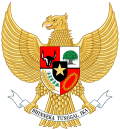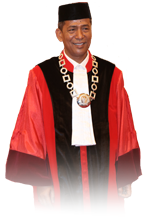| Deputy Chief Justice of the Constitutional Court of Indonesia | |
|---|---|
| Wakil Ketua Mahkamah Konstitusi | |
 | |
| Constitutional Court of Indonesia | |
| Seat | Jakarta |
| Appointer | Constitutional Court justices |
| Formation | 22 August 2003 |
| First holder | Mohammad Laica Marzuki |
The Deputy Chief Justice of the Constitutional Court of Indonesia (Indonesian : Wakil Ketua Mahkamah Konstitusi) is the second highest-ranking official serving on the Constitutional Court of Indonesia. Like the Chief Justice of the Constitutional Court of Indonesia, the Deputy Chief Justice is elected by the nine serving justices on the court from among their number.
Contents
In 2011, term limits for the Deputy Chief Justice as well as the Chief Justice were reduced from three years to two and a half years. [1]
